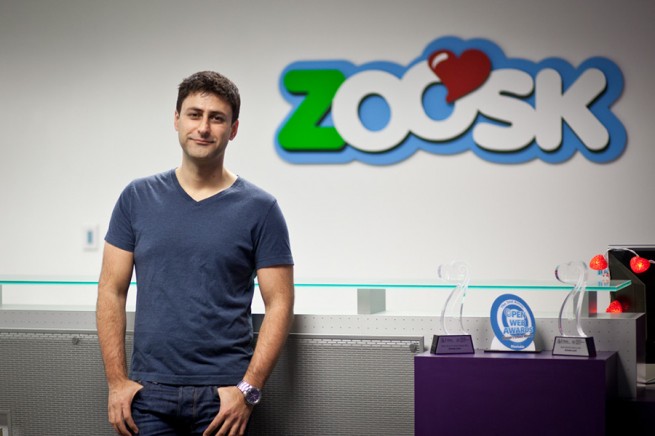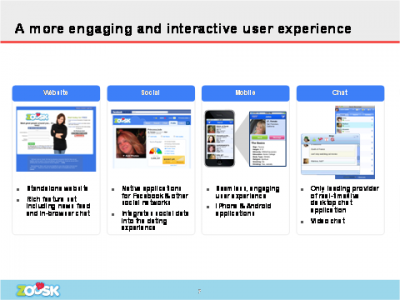Founded five years ago, Zoosk started to make a name for itself in online dating through Facebook and other social networking sites. Last year, it generated revenue of more than $90 million and was named in the top 50 venture-backed companies by the Wall Street Journal.
Not only has the success propelled Zoosk into one of the top online dating communities, but its features have gotten the attention of millions. Now the company is working to integrate gamification, or the use of game-like incentives such as achievements in non-gaming apps, into its online dating platform. GamesBeat sat down with Shayan Zadeh, Zoosk CEO, to delve deeper into the company’s gamification feature and the Zoosk world. Here’s an edited transcript of the conversation.
GamesBeat: Can you tell me a little bit about why you’ve decided to integrate gamification into the online dating format and how you are doing it?
Shayan Zadeh: Well, as you know, gamification is just a fancy word for giving consumers incentives to perform certain tasks. It’s not even a new thing or a web thing. We all remember the badges we would get back in school. So, the idea is as old as human behavior. However, we have been smart about bringing the same concept into the online dating world leveraging our virtual currency system, we are able to build incentives into the product that help guide users towards deeper engagement and other behaviors we find useful. For example, using a simple popularity system, we are able to drive users to reach out to more members, send more interesting messages, or even purchase virtual currency to advertise their profiles using our boost functionality.
GamesBeat: So, based on how active users are at Zoosk, they will receive incentives for their activities? Also, what type of incentives will the users get in return?
Zadeh: If I am an active user, it results in me receiving more profile views, more messages, more friend requests, etc. All of these inbound attentions add up as points towards my popularity. So, in this instance, I satisfy an inner need to win the popularity contest by being more engaged. It’s not a monetary incentive per se, but the desire to be announced more popular drives my behavior and we use only inbound actions in this ranking so a spammy user doesn’t game the system. They need to write thoughtful messages that result in the other side responding to them to get points.
GamesBeat: How does this differ from other online dating communities? Isn’t the main idea of any online dating community to be popular and have people look at your profile more to hopefully find a match for yourself?
Zadeh: We are the only site that actually gives you feedback on how you are stacking up against the rest of population, what accounts towards your rank, and gives you a “badge” if you will. So really playing on the gamification on all the elements of it. Another big difference there is that we allow users to purchase advertising on the site using our virtual currency which is fairly unique among online dating companies.
GamesBeat: So, essentially, Zoosk is trying to stay ahead of the competition by offering more ways for people to promote themselves and their profiles?
Zadeh: That’s correct and user response has been great to these features as well.
GamesBeat: We hear Zoosk is planning on enhancing its gamification features. Have those new features been implemented and what are the differences since the early stages of gamification on Zoosk?
Zadeh: No, those changes have not been implemented. At this time, there is not much I can discuss about the upcoming changes since they are in flux and we don’t really know which ones will pass our final user testing.
GamesBeat: Why have you decided to improve on the gamification of the web site?
Zadeh: What we have learned from our experiments with gamification is that you can get more out of the system both for the users and for the business. For example, providing a positive feedback loop on “good engagement” to our users has not only given them more incentive to engage with the product, but also has been driving the members to send more thoughtful messages.
Win-win for everybody and all of this change just by utilizing some gamification principles. So really as any business but especially as a web business, if you are not utilizing these techniques you are not only letting down your shareholders you are also leaving value on the table where your users are missing out.
GamesBeat: Why do you feel Zoosk is better as an online dating community than eHarmony or Match.com? Is it mainly the gamification or is there more you feel Zoosk is better at?
Zadeh: The core differentiation is that we are built as a social network as opposed to the older guys (eHarmony/Match.com) who are a bulletin board. A good way to think about it is to compare Linkedin versus Monster.com. Both sites help people find jobs or hire employees. The difference is how do you go about it.
Do you build a social graph that helps you achieve that goal or do you simply build a job board where transactions (applying for a job in this case) happen? The same is true when you compare Match.com and Zoosk for example. Our members build a special purpose social graph on the site which consists of people they would be interested in dating.
This graph evolves over time and has history. It allows for a more natural progression of relationships from the initial wink to actually going on a date. It also facilitates unique functionality in online dating world like chatting and online presence without the spam issues where others have failed. So, the graph is really the big difference. Then smart techniques like gamification, etc are just icing on the cake, and these differences have been the reason that we have been able to engage with an audience that was previously deemed unreachable by dating sites.
More than 70 percent of Match.com users are older than 35. They can not really engage with the younger audience. This is despite the fact that if you look at the singles population, most of them are younger than 35. eHarmony is even older. Zoosk for the first time made online dating available to below 35 audience. 70 percent of our membership is younger than 35 years old. a mind-blowing stat for the traditional online dating players.
GamesBeat: Zoosk is starting to offer more services to its community whether your customers are single or in a relationship. Can you tell me a little more about that?
Zadeh: Sure. we are working on a series of features that will allow people in a relationship to continue using Zoosk by building a digital home for their relationship. The idea is to allow members now in a relationship take advantage of features like date ideas, discounts on things to do together, etc.
We see this is a natural expansion of our offering so once we help you find somebody and transition to a new phase in your romantic life, we provide continue support to help build on this new relationship. We are really excited about this new feature set and will have more to share with the press and soon after the user base in a few weeks. We should definitely plan to get in touch in a few weeks when we can share much more.
_____________________________________________________________________________________________________________________________________
![]() GamesBeat 2012 is VentureBeat’s fourth annual conference on disruption in the video game market. This year we’re calling on speakers from the hottest mobile, social, PC, and console companies to debate new ways to stay on pace with changing consumer tastes and platforms. Join 500+ execs, investors, analysts, entrepreneurs, and press as we explore the gaming industry’s latest trends and newest monetization opportunities. The event takes place July 10-11 in San Francisco, and you can get your early-bird tickets here.
GamesBeat 2012 is VentureBeat’s fourth annual conference on disruption in the video game market. This year we’re calling on speakers from the hottest mobile, social, PC, and console companies to debate new ways to stay on pace with changing consumer tastes and platforms. Join 500+ execs, investors, analysts, entrepreneurs, and press as we explore the gaming industry’s latest trends and newest monetization opportunities. The event takes place July 10-11 in San Francisco, and you can get your early-bird tickets here.
VentureBeat's mission is to be a digital town square for technical decision-makers to gain knowledge about transformative enterprise technology and transact. Learn More


